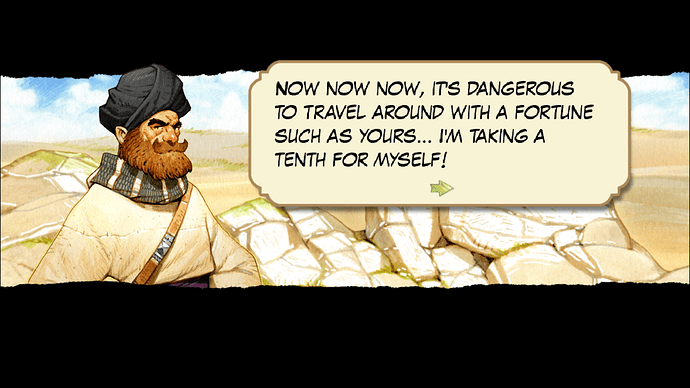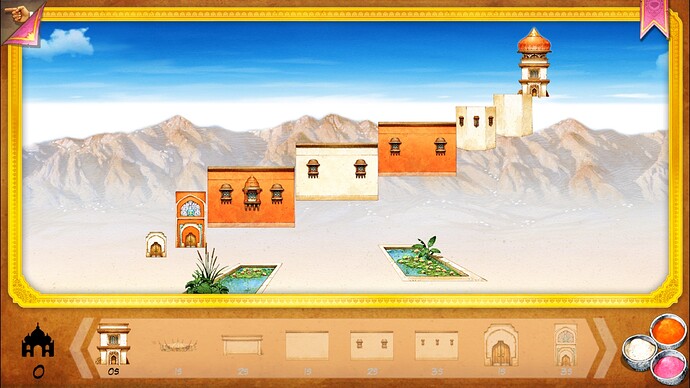Originally published at: http://statelyplay.com/2017/06/07/review-jaipur/
iOS, Android •
Jaipur on tabletop has long been highly regarded as a fairly light and quick, but still satisfying, economic game. The translation is everything we could hope for from an Asmodee digital title. Asmodee’s online service could improve in numerous ways (most notably by allowing asynchronous games), but they tend to choose games which support relatively large player bases so it is, at least, usually possible to find opponents. Solo play includes a generous campaign with a variety of tweaks to the formula, and, of the three AI opponents, only the easiest seems like a pushover.
Jaipur centers around a few tensions. Each turn, you’ll either take, swap, or sell cards, but you can only hold seven at a time. You may take cards from the central row of five options, or swap more than one of those for an equal number of your cards. When you sell, you sell all of your cards of a particular type, and you get increasing bonuses as you sell three, four, or five at a time. That pushes you to want to accumulate lots of cards in your hand, but doing so puts you closer to the limit. Once there, if a high-value card gets added to the center, you’ll spend a turn selling cards to clear hand space and give your opponent first crack at it.
[caption id=“attachment_2246” align=“aligncenter” width=“2208”]
Just one of the fun experiences you may encounter in the campaign. Jerk.[/caption]Adding to the tension of whether to sell a few cards for a small profit or risk foregoing a good opportunity are two other issues: most goods fetch higher prices for the first few sold. So selling just two cloth early on will get you eight points, but selling the last two will only yield two points. In addition, there’s one kind of card which doesn’t take up hand space but can’t be sold, only swapped: camels. When you take a camel from the center, you take all of them, and whoever has the most at the end gets a five-point bonus (which decides perhaps one in ten games–few enough that it’s not dominant, but not so small that it can be safely ignored, either). So games sometimes involve navigating a dynamic in which the center gets clogged up with mostly camels and one or two low-value cards, and the players then duel to see who can best bide their time until one of them takes all the camels and leaves the other with first pick from an almost entirely new row. If you’ve emptied your hand and have no camels, you’ll be unable to swap for everything good if more than one high card comes out, so you have to balance when it’s worth letting your opponent get first pick while still making sure you keep enough camels to react flexibly to new opportunities.
That’s a great set of tensions, and it gives the game the sort of balancing which leaves me feeling like I have authorship without making every game the same. The solo campaign also mixes things up beautifully, changing the rules slightly in each province you visit. For example, in some provinces goods get more valuable as the game progresses and in others, your hand limit is restricted or enlarged. You’re never quite sure what each new province in the campaign will unveil, but you’ll have to alter your strategies a bit in each to compensate for the subtle rule changes.
As wonderful as Jaipur is, I did something unusual for this review: after I played the game enough to feel like I could write about it, I went to visit family for the weekend and didn’t do any writing. I also didn’t choose to open Jaipur all weekend. Part of that is that Onirim has turned out to have surprising longevity for me and occupies a similar role in my life: both games are reasonably quick, light enough on rules that there’s nothing I fear misremembering, and well-suited to the phone. I suspect I just don’t much care for the goal of making more money than someone else (I was a philosopher for years, after all), and Jaipur, while quite good, doesn’t stand out as necessary for any particular reason.
[caption id=“attachment_2250” align=“aligncenter” width=“2208”]
The palace building software used to incentivize the campaign can be a touch fanciful.[/caption]I fear we may have reached the point at which the offerings of digital games which appeal to boardgamers are so plentiful, and so many of them are high-quality apps, that competition will disincentivize development of any but the most popular (or easiest to code). Jaipur is a quality game, and gamers who enjoy the tabletop version but would like more opportunities to play will find it nearly perfect, barring the usual disappointments that come with Asmodee multiplayer. But many of us will, I suspect, put it on the list of games we think would probably be great to try out some day, when there’s nothing else new asking more urgently for our attention, and will stay on that list forever, with something else always jumping the queue.


